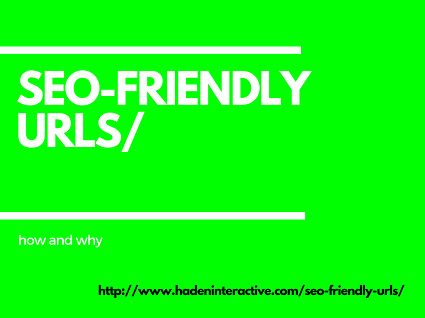Your cart is currently empty!

SEO Friendly URLs
The URL of your page is the thing you type in to go to a page, such as “www.HadenInteractive.com,” the thing you see in the bar at the top of the screen when you’re on a webpage. URL stands for Uniform Resource Locator — aren’t you glad you know that? — and is pronounced like “you are ell” rather than “earl.”
One of the things many people know or at least believe about SEO is that Google pays all kinds of attention to your URL, or at least to your page title. This is why you sometimes encounter a company called “Beachfront Spa” with a web address like “www.best-ft-myers-skin-care.com” or “www.oceanside-ca-medical-spa.com” or “betterskin4u.com.” The idea is that seeing those keywords in the URL will persuade search engines that your website is better than the competitor who used “www.AegisMedicalSpa.com.”
Search engines do pay attention to URLs. They look at a number of different things:
- Your domain. That’s the part you think of as the name of your website. For example, our domain is HadenInteractive.com. Google looks to see your domain and considers the overall authority of your domain. So, for example, if you have a page at your website with the URL “www.nationalgeographic.com/new-geography-insights,” you can feel pretty confident that Google will show your page when people look for new geography insights. That’s because, in this example, you are National Geographic, one of the most important thought leaders in the area of new geography insights. Buying the domain “newgeographyinsights.com” is not going to put you ahead of National Geographic.
- The path. That’s the part after the slash. In the example above, that’s “new-geography-insights.” That is part of the information about the content of your page which search engines notice. If your title is about new insights in geography and the content of your page is about cheap hotel reservations, search engines will not be fooled. They’re not that stupid any more. However, if the rest of your page content supports your URL’s claim that you’ve got the scoop on new geography insights, having the path say so is a good thing.
- The scheme. The scheme, which is usually “http” or “https” is noticed by Google, at least. They made a public announcement that they were going to start favoring secure websites (the https kind) over other websites, all things being equal.
A clean, memorable domain is good for your business because people will remember it and type it in. It will look better on your business cards, too. People might even guess it and find you without even asking Google, if they’re looking for you. We set up the websites we build with friendly URLs. If you don’t, you can end up with pages that have URLs like this one:
http://oceanside-ca-medical-spa.com/places/offers/article_f51814be-2aa1-11e3-93f0-001a4bcf887a.html
Seeing that on the search engine results page might not encourage you to click through. It doesn’t provide any useful information to search engines. And nobody will ever remember it and tell a friend about it.
When you choose a domain, we suggest a short, clear, memorable domain name. When you make a page, we recommend that you give it the best possible start by using a search-friendly path.
But should you change an existing URL to be more search friendly?
Recently, a client asked about changing the URL of his page to something more search friendly. He didn’t want to change the domain (often the biggest blow you can give to your website), but he wanted to change the path to an important sales page.
His page showed up #1 for a search for his company, and did very well for local search for the kind of business he owns, and for most generic terms people search for when they want his goods and services. His average position on the keyword for which he ranked lowest was 3.7, according to Google’s Search Console.
This means that changing the URL would have lost his page an excellent position in search. He didn’t realize — and in our experience most people don’t realize this — that changing the URL of your change is essentially publishing a new page. Any strength your page has developed over time will be gone. You will be starting over.
Sometimes it’s worth it, but usually it isn’t.
by
Tags:

Leave a Reply